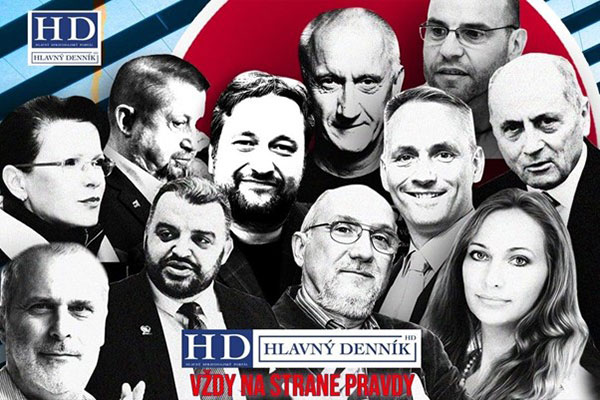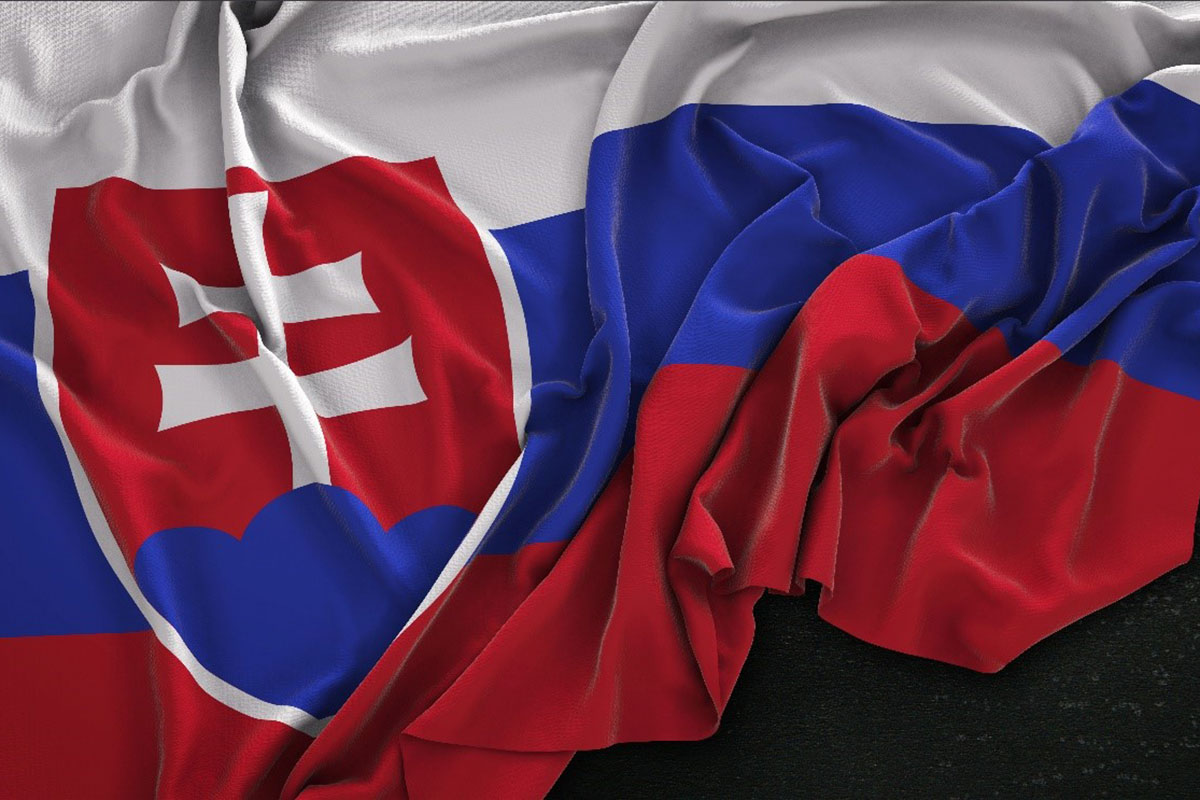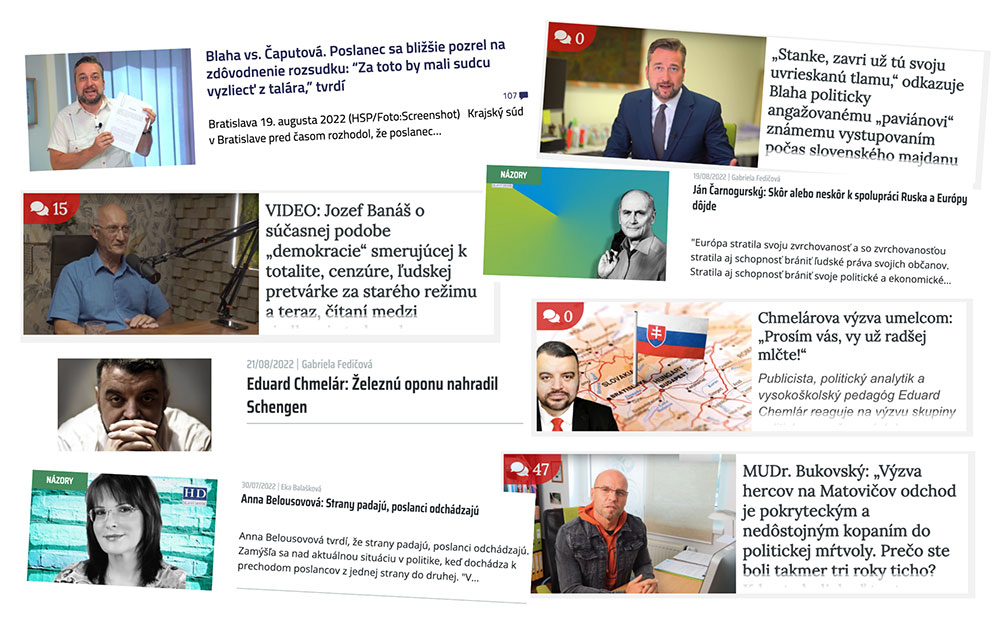The blocking of Slovak disinformation websites by the National Security Authority was an unprecedented step against pro-Russian websites spreading disinformation, conspiracies, propaganda, and toxic narratives. Unfortunately, it was also criticized for alleged suppression of freedom of speech.
The EU has reacted to Russian aggression against Ukraine by imposing sanctions on Russian state-owned outlets RT and Sputnik's broadcasting in the whole Union. It argued that these actors spread manipulative content, false information, and pro-Kremlin propaganda. Similarly, the Slovak Republic has learned about domestic actors disseminating these narratives to the Slovak and Czech audiences.
The National Security Authority (NSA) has thus gained a temporary competence to block websites that share harmful content about Russian aggression in Ukraine. It was introduced as part of a package of measures related to the situation in Ukraine. The measure to block domains of websites came after an amendment to the Cybersecurity Law.
The amendment allowed NSA to decide on blocking harmful content or activities in the online space. NSA may decide on its initiative or based on a request from another entity that is allowed to do so (Police or Slovak Information Service).
NSA has blocked four harmful sources
The decision on blocking a website has to include: 1. identification of the person operating the infrastructure on which the blocking is to be carried out, 2. identification of the harmful content or activity, and 3. the reason for and method of blocking.
Malicious content is defined as software or data that causes or has the potential to cause a cybersecurity incident; the definition of harmful activity refers to fraudulent activity, theft of personal data or sensitive data, serious misinformation, and other forms of hybrid threats.
The authors of the amendment proposal stressed that there had been a proliferation of disinformation and fraudulent statuses in Slovakia lately. It aimed to influence public opinion and play into Russian propaganda in reporting on the war in Ukraine.
NSA used the measure to block four disinformation media - Armádny magazín, Hlavné správy, Hlavný denník, and InfoVojna. The institution argued that their "harmful activities link directly to sources paid by Russian actors, aimed at manipulating public opinion.“
In fact, all the mentioned websites are infamous for spreading problematic pro-Russian content. Three were included on the list of top pro-Russian sources in Slovakia, created recently by the technological company Gerulata technologies. The website InfoVojna is not mentioned, but the list included its Facebook page and YouTube profile. The content of InfoVojna was also evaluated by the team of independent fact-checking portal Konspiratori.sk, which classified it with a rating of 8.8 from 10 (10 represents the worst quality). Armádny magazín has a mark of 7.2.
The initiative evaluates the websites according to several criteria, such as publishing pseudo-scientific content, disinformation narratives, or extremist content.
According to the chief editor of Infosecurity.sk Matej Spišák, the main problem with Hlavný denník was that the media was sharing pro-Russian content published by the Strategic Culture Foundation, reported by the U.S. State Department as run by Russia's foreign intelligence service SVR (The Foreign Intelligence Service of the Russian Federation). The websites Hlavné správy and Armádny magazín were recently involved in spying for Russia, using one of its authors Bohuš Garbár.
 The collage contains photos of people cited by Hlavný denník regularly. The red sign at the bottom of the picture claims that the media “always stands on the side of truth,” despite citing pro-Kremlin actors, propagandists, and disinformers such as opposition politicians Ľuboš Blaha of SMER - Social Democracy or Eduard Chmelár of political movement Socialists.sk (included in the picture). Other blocked media also cite many of the actors depicted.
The collage contains photos of people cited by Hlavný denník regularly. The red sign at the bottom of the picture claims that the media “always stands on the side of truth,” despite citing pro-Kremlin actors, propagandists, and disinformers such as opposition politicians Ľuboš Blaha of SMER - Social Democracy or Eduard Chmelár of political movement Socialists.sk (included in the picture). Other blocked media also cite many of the actors depicted.
Based on the regular media monitoring done by analysts of Infosecurity.sk, these four websites were (and they are again after lifting the block) spreading a wide range of disinformation and conspiracy narratives for a long time. This became especially problematic during the Covid-19 pandemic, with disinformation actors covering the nationwide testing, vaccination campaign, and other measures taken by the government.
Disseminating false information and pro-Russian propaganda, these media were partly responsible for the anti-vaccination protest movement in Slovakia during the summer of 2021.
Websites were trying to legitimize Russian aggression
Having a large audience built in Slovakia, these four websites were strong opinion-makers before and after the start of Russian aggression against Ukraine. They continually disseminated harmful narratives and propaganda aimed at discrediting Ukraine, the EU, and the US, undermining their actions and solidarity with Ukraine and supporting the official Russian rhetoric on the other side.
 Source: freepik.com
Source: freepik.com
This included spreading harmful narratives built on myths about Ukraine that serve to discredit Ukraine’s statehood and legitimize Russian aggression. These myths include statements such as Ukraine is an artificial state, it is corrupt, it has no history. It is run by fascists (“ukrofascists''). These, and many other myths, try to generate the impression of the state which should be “de-Nazified”, “de-militarised,” and brought under Russian rule. Moreover, these media were spreading the narrative of aggressive NATO and the West, which allegedly threatened Russia using Ukraine for their imperial needs.
Narratives about Ukraine creating biological weapons or suppressing the Russian minority in Donbas and Luhansk regions were also present.
InfoVojna tried to dodge the NSA’s decision by moving the website to Belize, creating the .bz domain. However, the NSA can also block pages not located on the Slovak domain. Facebook pages of these four websites were also shut down, blocking the page of MP Ľuboš Blaha, considered “the most toxic Slovak MP.” Meta took this step to prevent spreading harmful content on its platforms, as Blaha repeatedly violated the social network's rules.
Meta said in the statement that "this page has been taken down due to repeated violations of our rules regarding hate speech, bullying and harassment, inciting violence and misinformation, and harming people.“
Spreading strong pro-Kremlin narratives, Blaha’s posts were also published on the four websites.
 Examples of the articles by Hlavný denník, Hlavné správy, and Infovojna promote ideas of the above-mentioned pro-Kremlin actors. The two articles on the top of the picture cite Ľuboš Blaha.
Examples of the articles by Hlavný denník, Hlavné správy, and Infovojna promote ideas of the above-mentioned pro-Kremlin actors. The two articles on the top of the picture cite Ľuboš Blaha.
In reaction to the blocking, these websites created new channels such as Facebook pages (Hlavný denník has another page named “Denník,” which is still functional) or Telegram accounts (Hlavné správy, Hlavný denník, InfoVojna), thus continuing to spread disinformation and conspiracies. The situation also urged other problematic media to open a discussion on "freedom of speech.“
Several websites were trying to create an impression of injustice, using terms such as blocking “inconvenient websites,” “so-called harmful websites,” or putting the word harmful between the quotation marks. The blocked website InfoVojna calls the NSA’s action a “censorship of patriotic websites,” Hlavné správy talks about “suppression of freedom of speech, censorship, and sign of fascism.”
The website napalete.sk cites Tibor Rostas, the chief editor of another problematic media Zem & Vek, on the topic. Rostas, who was convicted of racial defamation and nation in the past, claims that the blocking by NSA represents an analogy to unfreedom and censorship under socialism, especially in the darkest 1950s and the period of normalization. "Preventing critical media from publishing is the only way for those in power today to deal with the facts. With their mental capacity, they cannot handle democratic debate, so they reach for restrictions. They don't realise that the truth will always find a way," said Rostas.
The NSA’s amendment brought controversy
On March 3, Slovak law agency Via Iuris argued that the amendment to Cybersecurity Law is significant but it has several deficits, such as the unclear rules and processes based on which the blocking of websites is decided, as well as the lack of definition of key terms.
For instance, the term “disinformation” has not yet been codified in Slovakia. NSA shares the glossary of key terms related to hybrid threats, including disinformation, but law does not specify these.
There are also other problematic areas regarding the amendment. For instance, it states that websites have to be shut down by infrastructure operators (hosting providers, internet connection providers, or the administrator of the national domain SK-NIC) based on the NSA's decision. However, the Cybersecurity Act does not provide any sanctions for infrastructure operators who do not implement the NSA's decision.
Also, after blocking the first website, the process still lacked an explanation of the reasons and the rules of the blocking. Via Iuris implies that the whole process lacked transparency, and without clear and transparent rules, the intervention by the state may do more help than harm to disinformers arguing that they are being censored and silenced.
The temporary validity of the NSA's competence may also be considered one of the weak spots. From the phrase "with effect until," it can be deduced that after the given date, the blocked harmful content will be unblocked, and unless new legislation is adopted, it will not be possible to issue a new decision to block by the NSA.
The decisions on four blocked websites were, therefore active until June 30. Slovak MPs extended the ability to block harmful content until 30 September, but they did not consider transitional provisions. The NSA spokesman explained that "the legislative change has extended the authority's power to decide to block harmful content or harmful activity until 30 September 2022. The amendment did not take into account the transitional provision, i.e., it did not extend the validity of the current decisions, and therefore a new procedure is necessary in the case of the entities concerned."
Currently, the NSA is not blocking any website.
The NSA may not lose its competence to block harmful content. In May, an amendment was passed that would allow it to retain its power in the future, but now the security authority would need court approval to do so.
The blocking of websites has been met with approval, especially within the Slovak security community and state authorities. On the other hand, many know that the move has also caused discontent and accusations of censorship of alternative media. We can expect further steps by the NSA in the future. Still, these will probably require more detailed and precise justifications, as they will be under scrutiny not only by the media but also by the non-governmental sector and other institutions.
Even though the fight against disinformation is very important in Slovakia, the state is walking on thin ice, mainly because its reaction came late, and the disinformation scene has developed to large proportions.
In addition to blocking, it will have to reach for other solutions, such as new approaches in education. Otherwise, the disinformers may risk gaining more supporters, as they will relentlessly argue that they are being oppressed and silenced because they are telling the truth.
Please refer to the Terms before commenting and republishing the content. Note: The views and opinions expressed in this article are those of the author and do not necessarily reflect the views of the Institute of Communication Studies or the donor.


